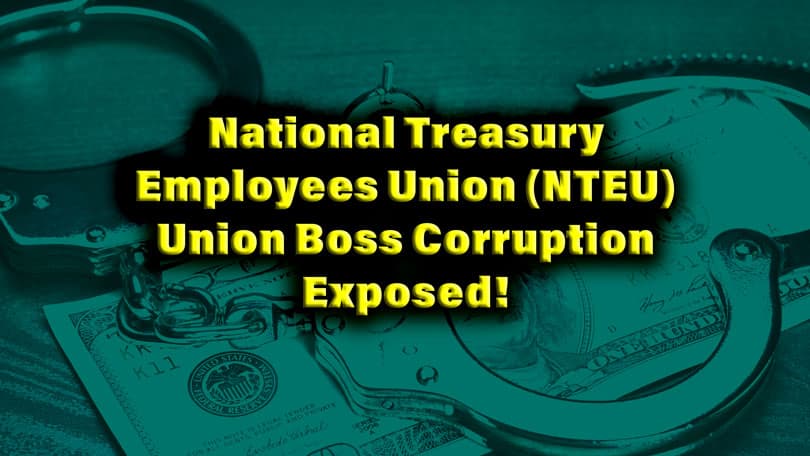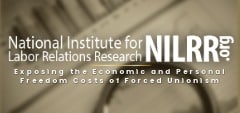The NTEU Scandal: A Case Study in Union Corruption

Unveiling Union Corruption and the Perils of Forced Unionism
At the National Institute for Labor Relations Research (NILRR), we are committed to exposing the systemic issues surrounding forced unionism via monopoly control of employees and the corruption that often festers within union hierarchies. For decades, Big Labor has wielded immense power over American workers, frequently prioritizing personal gain and political agendas over the interests of the very employees they claim to represent. Recent events, such as the scandal involving the National Treasury Employees Union (NTEU), underscore the urgent need for reform and the importance of protecting workers’ freedom to choose whether or not to associate with unions. NTEU union bosses, like all union bosses under current questionably unconstitutional employment laws, are granted monopoly control over all treasury employees under a labor contract even if many or even most employees do not want the union.
[In the 2018 Janus v. AFSCME case, the U.S. Supreme Court recognized the unconstitutionality of mandatory union control over unwilling employees. However, the Court’s narrow ruling only permitted government employees to opt out of paying union dues and fees, falling short of fully addressing the issue. Had the Court abolished the broader, constitutionally questionable union monopoly powers, it would have restored genuine choice and freedom for all employees. If you wish to exercise your Janus Rights as a government employee, visit: MyJanusRights.org for free help.]
The NTEU Scandal: A Case Study in Union Corruption
A recent exposé by USA Today revealed a disturbing scandal within the NTEU, one of the nation’s largest federal employee unions. The article detailed allegations of financial mismanagement and self-dealing by union officers, painting a grim picture of an organization more concerned with enriching its union bosses than serving its members. As Stan Greer, a senior research associate at NILRR, aptly stated in the USA Today article, “Union bosses have a long history of treating dues-paying members like their personal piggy bank, and this is just the latest example.”
This scandal is not an isolated incident but rather a symptom of a broader issue: the unchecked power granted to union officials under forced unionism via monopoly power over each employee’s benefits, salary, and opportunities for advancement. When workers feel compelled to pay dues or fees as a condition of employment, unions amass vast financial resources with little accountability. These funds can be misused for lavish perks, political lobbying, or outright embezzlement, as seen in numerous cases across the country.
The Evils of Forced Unionism
Forced unionism, where workers are forced under a union contract to keep or get a job, or as in the private sector, are required to join or financially support a union to keep their jobs, is fundamentally at odds with individual liberty. It strips employees of their right to decide for themselves whether a union’s services are worth their hard-earned money. Here are some of the most egregious consequences of this coercive system:
• Erosion of Worker Freedom
Under forced unionism, employees are denied the freedom to opt out of union membership or dues payments without risking their livelihoods. This violates the principle of free association and treats workers as pawns in Big Labor’s power games. In the private sector, Right-to-Work laws, which NILRR champions, offer a solution by ensuring that union membership and financial support are voluntary, empowering workers to make their own choices. But, like Janus Rights, it does not eliminate monopoly control over their opportunities, pay, and benefits.
• Misuse of Dues for Non-Representational Purposes
Union officials frequently divert dues to causes unrelated to workplace representation, such as political campaigns or ideological crusades. For example, in 2024, the AFL-CIO and its affiliates spent well over $200 million on political activities, much of it funneled to candidates and causes that many dues-paying members did not support. Forced unionism enables this misallocation, leaving workers with no say over how their money is spent.
• Breeding Ground for Corruption
The NTEU scandal is just one of many examples of union corruption facilitated by forced unionism. Without the pressure of voluntary membership, union leaders face little incentive to act transparently or prioritize members’ needs. High-profile cases, like the United Auto Workers (UAW) embezzlement scandal in 2020, where over a dozen officials were convicted of stealing millions in dues, highlight how forced dues create a slush fund for unethical leaders.
• Stifling Economic Growth
Forced unionism also harms the broader economy. By driving up labor costs by imposing rigid work rules, unions can deter investment and job creation. States with Right-to-Work laws, which prohibit forced unionism, consistently see higher job growth and personal income increases compared to forced-unionism states. According to NILRR research, Right-to-Work states clearly experience faster employment growth than their forced-unionism counterparts.
The Path Forward: Empowering Employees Instead of Union Bosses
The NTEU scandal serves as a wake-up call for policymakers, workers, and advocates of economic freedom. To curb union corruption and dismantle the evils of forced unionism, several steps are critical:
• Expand Right-to-Work Protections and End Mandatory Monopoly Bargaining
Currently, 26 states have Right-to-Work laws, but millions of workers in other states remain subject to forced unionism. Congress should pass the National Right-to-Work Act to ensure that no American is compelled to fund a union against their will.
• Increase Transparency and Accountability
Unions must be required to provide clear, itemized reports of how dues are spent. The Department of Labor’s Office of Labor-Management Standards should strengthen enforcement of financial disclosure rules to deter mismanagement and fraud.
• Protect Whistleblowers
Workers who expose union corruption often face retaliation. Robust protections for whistleblowers can encourage accountability and deter malfeasance.
• Educate American Workers on Their Rights
Many employees are unaware of their rights under existing labor laws, such as the ability to opt out of certain dues payments for political activities. NILRR’s ongoing efforts to inform workers about their options are vital to breaking Big Labor’s stranglehold.
A Call to Action
The National Institute for Labor Relations Research remains steadfast in its mission to promote worker freedom and expose the abuses of forced unionism. As the NTEU scandal demonstrates, union corruption thrives in environments where workers are stripped of choice and union bosses operate without scrutiny. By advocating for Right-to-Work laws, transparency, and accountability, we can restore power to individual workers and build a labor system that prioritizes employees’ interests over those of entrenched union boss oligarchs.
Join us in this fight for fairness and freedom. Visit NILRR.org to learn more about how you can support our efforts to end forced unionism and hold corrupt union officials accountable. Together, we can create a workplace where every employee’s voice is heard and respected—free from coercion and exploitation. And, if you are government employe, you can take action to stop paying union dues and fees today at https://myjanusrights.org/.
Sources:
• USA Today, “National Treasury Employees Union Scandal,” May 28, 2025 by Erin Mansfield
• NILRR Research, “2025 Spring Right to Work Benefits Fact Sheet”
• U.S. Department of Labor, Office of Labor-Management Standards, 2024 Reports

